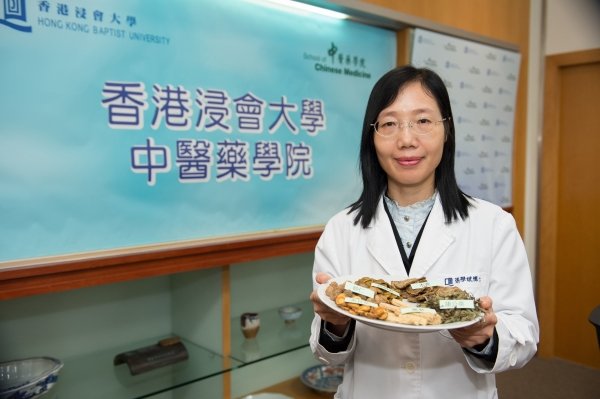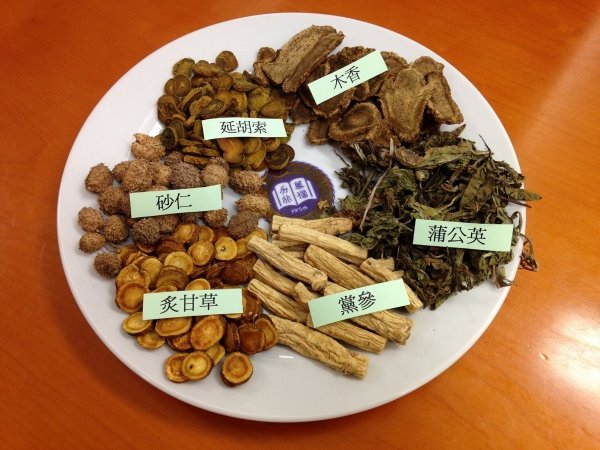Campus Digest
Clinical study finds Chinese medicine treatment of chronic gastritis has efficacy rate of nearly 90% in blocking gastric precancerous lesions
21 Aug 2014
A clinical study on chronic gastritis patients conducted by the Clinical Division of the School of Chinese Medicine (SCM) reveals that over 60% of the patients have fully recovered or been obviously cured with Chinese medicine treatment, achieving an overall efficacy rate of 95%. Even if the patients had exhibited symptoms of gastric precancerous lesions, the treatment helped to block the development of gastric precancerous lesions, resulting in a clinical efficacy rate of 90%.
Stomachache is a common health problem among city-dwellers. If not treated properly, it may develop into chronic diseases such as superficial gastritis or atrophic gastritis resulting in symptoms such as abdominal pain, reduction in appetite and decline in energy. If the problem worsens, the disease may enter the stage of gastric precancerous lesions comprising intestinal metaplasia and atypical hyperplasia – a critical stage in the onset of stomach cancer, which indicates a greatly increased risk of gastric carcinoma. Chinese medicine treatment can reverse the onset of symptoms of atrophic gastritis as well as block the development of superficial gastritis into atrophic gastritis. Even if patients were found to have symptoms of gastric precancerous lesions, the intervention of Chinese medicine helps to block the worsening of symptoms, reverse the progress of the disease back to the early stage of chronic gastritis, subsequently eliminate pathogenic factors, strengthen qi and nourish the patients’ spleen and stomach.
From August 2012 to April 2014, Dr Zhang Xuebin, Senior Lecturer of the Clinical Division of SCM, attended to 1,014 visits by patients with symptoms of gastric distention and stomachache. The clinical study was conducted on 127 patients, aged from 17 to 80 (56 male and 71 female), who had suffered from the illness from 1 month to 40 years. All of them were diagnosed by Western medicine doctors as having chronic gastritis and their health conditions were in line with the diagnosis of stomachache in Chinese medicine.
Dr Zhang prescribed Chinese medicine treatment for patients for a period ranging from a week to 18 months according to the assessment of their individual health conditions from the Chinese medicine perspective. After the completion of the treatment, 19 patients (14.96%) have fully recovered with no more symptoms of gastric distention and stomachache, and the illness did not recur within 6 to 12 months, while an obvious curative effect was observed in 62 cases (48.82%) in which gastric distention, stomachache as well as most of other symptoms were not observed and there was no relapse within 6 to 12 months. Among 40 effective cases (31.5%), symptoms of gastric distention and stomachache were relieved to a great extent and patients experienced shortened and less pain during the relapse within 6 to 12 months. The remaining six patients (4.72%) showed no improvement. In conclusion, the overall efficacy rate of Chinese medicine treatment for chronic gastritis is 95.28% while the rate for recovery and significant efficacy accounted for 63.78%.
Dr Zhang said that Chinese medicine is also effective in treating chronic gastritis cases which have developed into intestinal metaplasia stage. The same clinical study revealed that among the 22 patients (17.3%) who were experiencing intestinal metaplasia symptoms, an obvious curative effect was observed in 12 patients (54.55%) while eight patients (36.36%) found the treatment effective and two patients (9.1%) showed no improvement. In other word, the overall efficacy rate is 90.9%.
In addition, the study also analysed chronic gastritis patients according to the definition of Chinese medicine syndromes. It found that 45 patients (35.43%) have weak spleens and stomachs, 38 patients (29.92%) have disharmony in the liver and stomach, 22 patients (17.32%) have dampness and heat in the spleen and stomach, 16 patients (12.6%) experience yin deficiency in the stomach, the remaining six patients (4.73%) have blood stasis in the stomach. Dr Zhang said that most of the symptoms related to the spleen, stomach and liver and she attributed the high occurrence of the disease to the humid and hot weather in Hong Kong together with Hong Kong peoples’ habit of consuming cold food and drinks as well as the hectic and stressful lifestyle of the city. Dr Zhang considered the 17.3% of patients with intestinal metaplasia symptoms as serious and said they should not be overlooked. She called on the members of the public to seek medical advice as soon as they get sick, to protect their stomach in their daily lives by adopting healthy eating habits – a fixed schedule and fixed amount of food consumed at regular eating speed, and avoiding food which is too hot, too cold, greasy or spicy.

